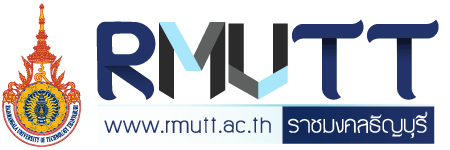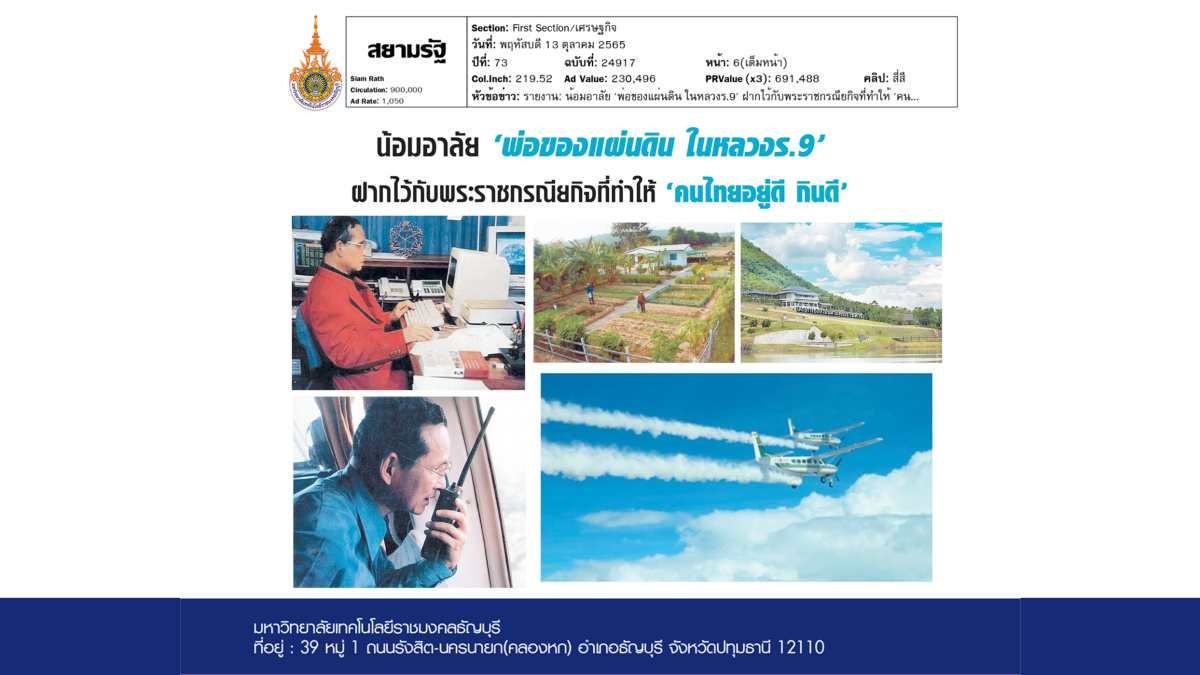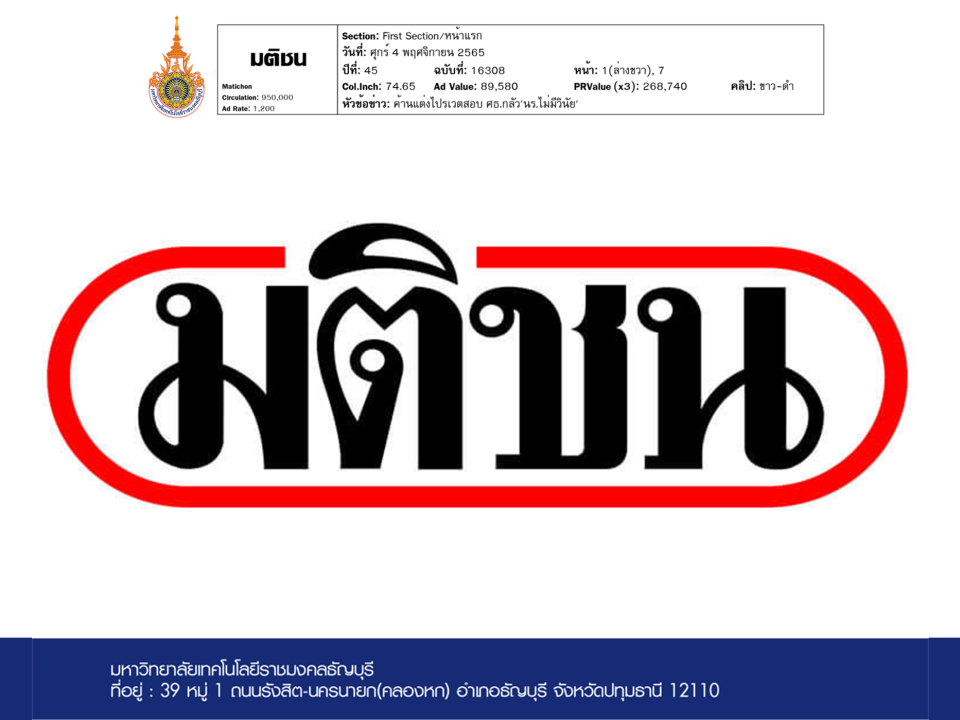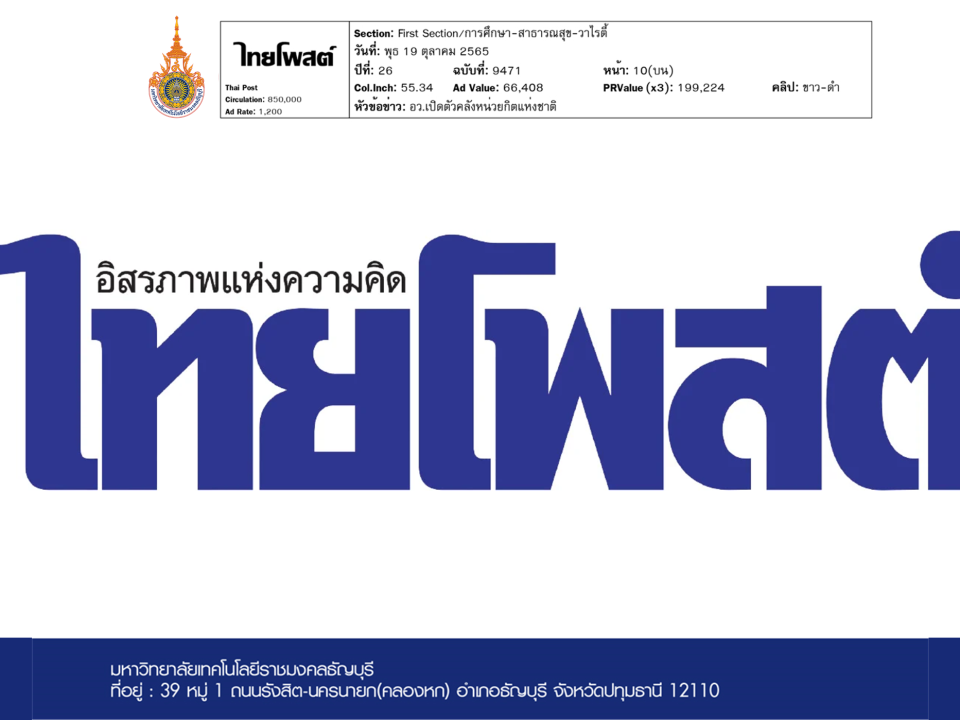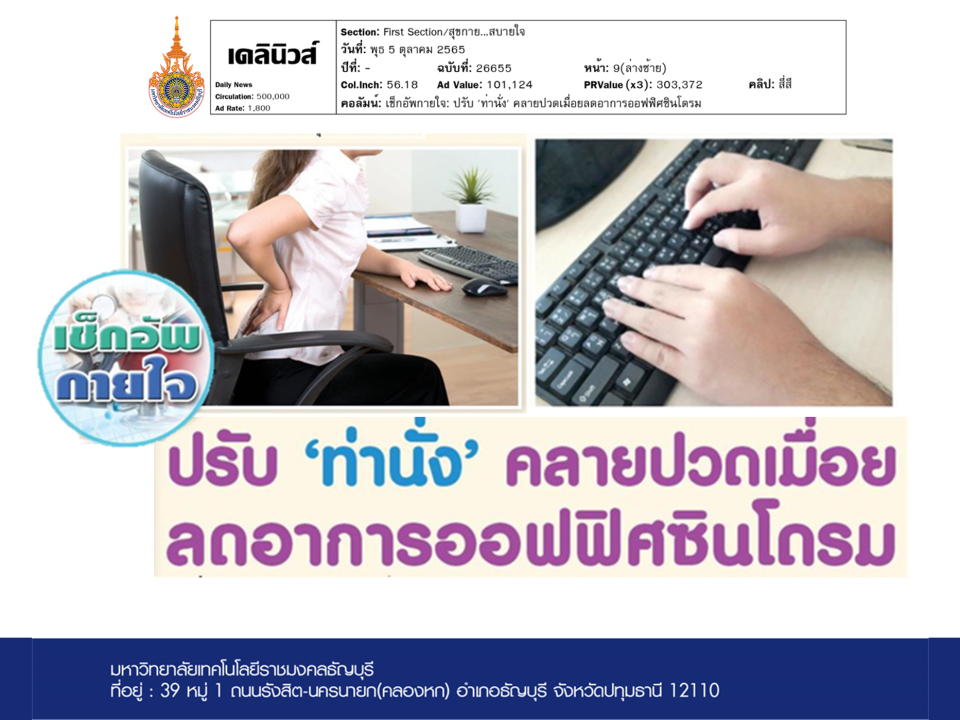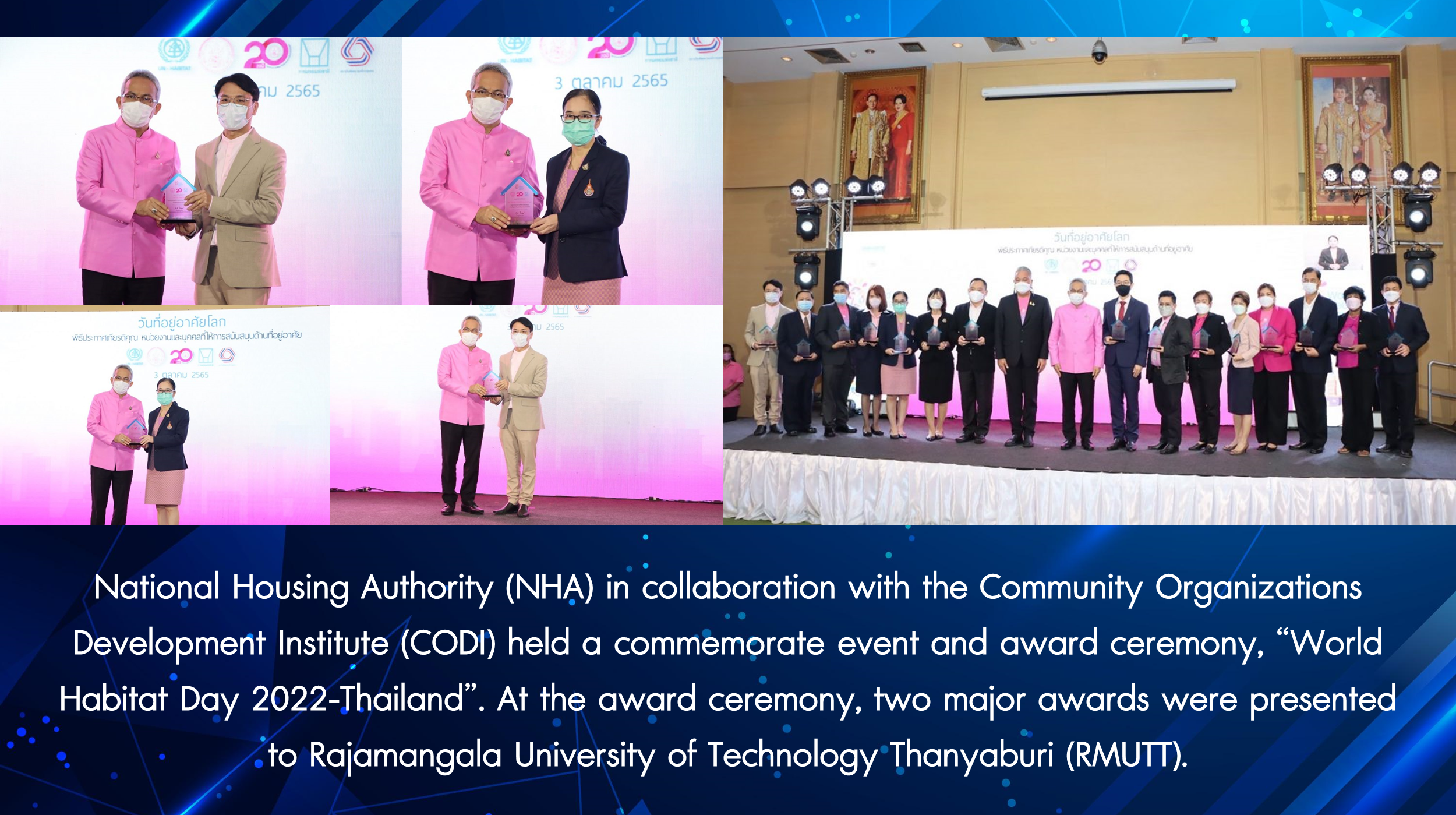
RMUTT is proud to bag two major awards of “World Habitat Day 2022-Thailand
06/10/2022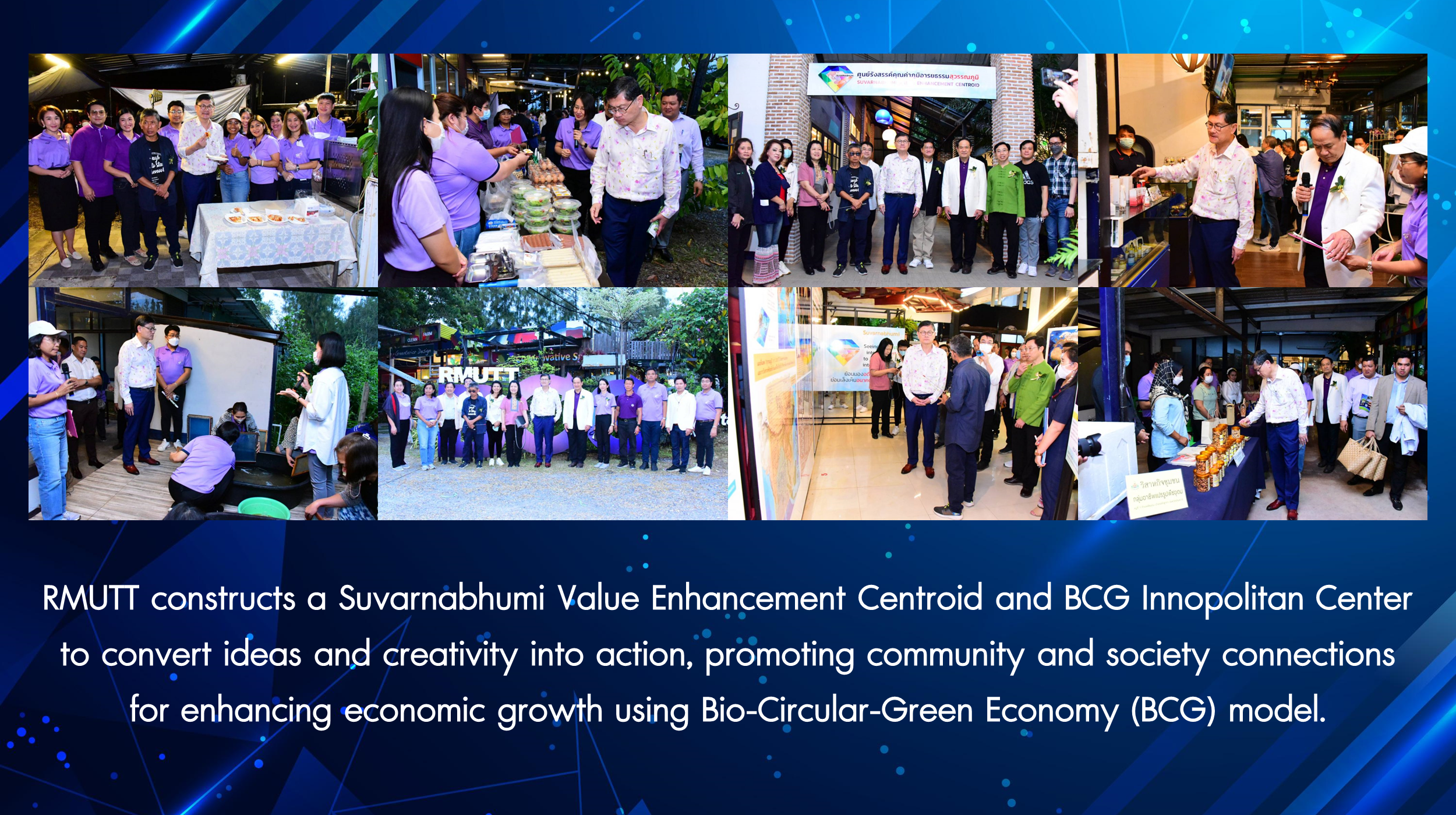
RMUTT constructs a Knowledge Exchange Center for ‘Economy, Community, and Social improvement’ with BCG model
17/10/2022Siamrath : Published 13 Oct 2022
October 13, 2022 is the His Majesty King Bhumibol Adulyadej the Great Memorial Day. It’s the day that people of Thailand lost their beloved King who had always been regarded as ‘Father of Thailand’. Tears were still shed by many people and mourners still clutched portraits of their late king. Regardless of his passing, the people of Thailand still remember and cherish the king’s selflessness, generosity, and compassion and learn to follow his footsteps and carry on his legacies.
Throughout his reign, the King continued to unify and strengthen the country by establishing his Royal Initiative of the ‘Philosophy of Sufficiency Economy’. Sufficiency Economy is a philosophy based on the fundamental principle of Thai culture. It is a method of development based on moderation, prudence, and social immunity, one that uses knowledge and virtue as guidelines in living. Significantly, there must be intelligence and perseverance which will lead to real happiness in leading one’s life.
The New Theory is the most distinct and concrete example of the application of the Philosophy of Sufficiency Economy to the agricultural sector. His Majesty King Bhumibol initiated this theory to help Thai farmers who suffer from the impacts of economic crisis, natural disasters and other unproductive natural conditions. The New Theory suggests that sufficiency means to lead a reasonably comfortable life, without excess, or overindulgence in luxury, but enough. To achieve the goal, one must always work hard, be patient, use your mindfulness and wisdom, be helpful and creates unity.
New Theory: The Basic and The Advanced
The Basic of New Theory will be focusing on helping Thai farmers who suffer from the impacts of water scarcity is the lack of sufficient available water resources to meet the demands of water usage for consumption and farming within a region. In tune with the Philosophy of Sufficiency Economy, His Majesty introduced the unprecedented approach to manage farmland by designating land for pond to store rainwater during the rainy season while during the dry season it serves to supply water to grow crops. growing fruit and perennial trees, vegetables, field crops and herbs for daily consumption is a must. If there is any surplus, it will be sold. This approach will certainly create self-immunity meaning practitioners will develop the strength and resources to survive.
Regardless of how well the practitioner applies New Theory (Stage 1), extensive assistance from the public, nonprofit and private sectors are required. Promotion and empowering individual, family, or community to help develop their own community enterprise and networks are equally important as mentioned in New Theory (Stage 2). To achieve the New Theory, foundation of giving, and sharing should be laid.
In light of His Majesty’s genius in the use of telecommunications to serve the public for many decades, he was honored by the people of Thailand entitled him as “Telecom Father of the Nation. He had always devoted himself to create better lives for his people and one of those ways was to use communication technology to render help to people in times of emergency.
- Radio Communication: His Majesty King Bhumibol Adulyadej had played his key role in improving Thailand’s radio communication system. During his time of working, King Rama 9 had always been using his walkie-talkie to him connected to carry out his activities including his mission on royal rainmaking project. In his first phase of artificial rainmaking, he had a lot of trouble in communicating with his operators owing to bad weather. He, therefore, made his decision to set up radio system for his Royal Rainmaking Operation Group both for air-ground communication.
- Radio Broadcasting: In 1952, his Majesty King Rama 9 established the A.S Radio Station in his Royal Dusit Palace. Regarding the name of Radio Station, A.S. also known as Amporn Sathan which is the first place where his very first radio-broadcast was done. Later on, he moved his A.S. Radio Station to his Chitralada Villa Royal Residence with hope of communicating directly and bringing him closer to his people. “During the devastation caused by the massive storm crisis at Laem Talumphuk cape in 1962, King Rama 9 used his radio-station as headquarter for helping disaster victims which later became the Rajaprajanugroh Foundation. The foundation mission was to grant educational support for those who possess knowledge and skills. They can either be a government official or general citizen. He hoped that he would have a lot of people coming in to help him work. Interestingly, all of the foundation staffs are volunteers while all expenses of the foundation were responsible by the King. ‘Be economical, be worth’ had always been the King’s policy.”
- Computer: In 1986, ML Usni Pramoj as Thailand’s Privy Council bestowed King Rama 9, a MacIntosh Plus Computer, which is one of the most modern computers during that time. This is the very first time that King Rama 9 used his first computer. Not only he was so interested in the computer, he also loves to know about all technical components of computer. Sometimes, he opened a desktop computer case to see how the hardware works and he also managed to update his own software including CU Writer for his work. Because he realized how important computer technology could be to his Thai people and their lives, the King dedicated himself all he could to make Thailand better with his knowledge of computer technology.
- Satellite: Thaicom satellite is regarded as one of the symbols of Thailand’s advancement in telecommunication technology. Thaicom has been used to provide educational constructionism for the people of Thailand creating opportunity for equal and expansive information and communication access in order to promote the opportunity for better education and improve living for Thai people. You could say that King Rama the Ninth had continuously performed his key roles in radio communication system for his country. Because of his great vision of how vital communication system is to Thailand, he devoted himself to telecommunication.
- In 1995, with real-time weather monitoring system using internet, Thai Meteorological Department was able to detect Angela Typhoon passing through Philippines causing major damage houses, crops, and livelihoods but the department enabled to give officials warning of the danger of typhoon in several regions of Thailand. In July 20th, 2006, before King Rama 9 got his 5 hour-backbone surgery, he asked his assistants to install internet online system because he would like to know the real-time situation of typhoon which was then moving pass Vietnam and sooner turned into just depression.
- Digital Edition of the Tipitaka As one of his Majesty King Bhumibol Adulyadej royal projects, volumes of the Atthakatha (Commentary) were created in digital edition making them easier to publicize to the public. In May, 1991, his Majesty King donated his money to help Mahidol University develop a more efficient search program, BUDSIR IV and complete Thai translation edition of the Tipitaka.
- King Bhumibol created the New Year’s cards himself using his personal computer every year starting in 1988. He typed his wishes and printed them in black and white before sending them with facsimile machine to government departments. These messages reflected problems and obstacles of what Thailand was facing during the year. Since then, his messages were published in newspaper on January 1st of every year.
One of the King Rama 9’s most remembered royal duties in the history of Thailand was his Royal Development Project concerning mass transportation including Bangkok’s Mass Rapid Transit network (MRT). H.M. King Bhumibol Adulyadej himself presided over the official inauguration ceremony of M.R.T. Chaloem Ratchmongkhon Line (Hua Lamphong-Bang Sue) at Hua Lamphong Station. On this special occasion, H.M. King Bhumibol boarded an electric train carriage number 1014 to ride from Hua Lamphong station to Bang Sue station and back to Maintenance Center, which took 29 kilometers. During his travel, he was interested in discussing various subjects regarding road maintenance, construction of new bridge pillars at MRT Sri Lom station, construction of a 20 km road to help solve traffic congestion problem as well as electric train control system and fare prices of MRT.
Another Royal Project, initiated by His Majesty King Bhumibol Adulyadej, known as “Chang Hua Man Royal Project” in Phetchaburi province is famous in Thailand for helping grassroot communities including individuals and family to thrive sustainably. Initiated in the middle of the mountain valley, the place has been turned from drylands and land degradation resulted from, 35 rai lemon farming, 30 rai of sugar-canes and the rest, Eucalyptus farming into economic botany of pineapple, lemon, coconut, sweet potatoes, dragon fruits, ‘Petch’ rose apple, banana, pumpkin, basil, sweet basil chili, as well as regular rice and sticky rice and rubber trees. Even small of pesticides and chemicals are restricted. There are also chicken farms and agro-tourism farms available.
With contributions from Royal Thai Army, Rajamangala University of Technology Thanyaburi (RMUTT) and Prapai Technologies Co Ltd. joined hands to design, develop, and install twenty 50 KW electricity generator wind turbine on “Chang Hua Man Royal Farm” to sell wind electricity to the Provincial Electricity Authority (PEA). In addition, areas under the wind-turbine will also be available for grass farming for cows.
Last but not least, H.M. King Bhumibol Adulyadej initiated his “Royal Rainmaking Project” aiming to help and support Thai farmers repeatedly suffered the effects of drought for drinking and farming due to insufficient rainfall during the long dry season. Sometimes rainy season comes too late and dry season come to early leading to a decrease in vegetation hurting Thailand’s economy annually. Since H.M. King Bhumibol made his observation both by land and air, he noticed that the weather was cloudy, yet it did not result into precipitation. As every cloud has a silver lining, literally, he found one while watching the clouds – an idea of “scientific procedures” how to draw droplets from the clouds onto the farmlands.
He believed that Thailand enjoys tropical climate which is influenced by seasonal monsoon winds. The southwest monsoon brings a stream of warm moist air from the Indian Ocean towards Thailand, causing abundant rain over the country, especially the mountainous regions making an average growing season. Since 1955, H.M. King Bhumibol Adulyadej spent a lot of his time in researching, analyzing, and evaluating documents regarding meteorology and weather modification until he was skilled and had confidence in realizing his ideas. Then, he expressed his ideas to M.R. Debbhri Devakul, an agriculture engineer who was an expert in research and invention at Ministry of Agricultural and Cooperatives. Not until 1969, In 1969, the Ministry of Agriculture and Cooperatives established the Insecticide Aviation Unit, under the Rice Department to support and respond to H.M. King Bhumibol Adulyadej’s desire. Accordingly, H.M. King Bhumibol Adulyadej directed to conduct during the year of the first actual flight experiment on the 1st and 2nd of July 1969. The Ministry of Agriculture and Cooperatives appointed M.R. Debbrihi Devakul for the director of the project and head of the experimental group. M.R. Debbrihi Devakul chose Khao Yai National Park to be a suitable test site. He started the first trial flight by seeding substances (dry ice, or solid carbon dioxide) of which the size was not greater than one cubic inch at the top of clouds. The height of this cloud which soared dispersedly over the test site was not over than 10,000 ft. Then, the cloud physical shape obviously changed. The cloud mass coalesced and condensed. Its top was built up higher and it became a large rain cloud rapidly and moved following with the wind direction. Unfortunately, rain could not be observed due to mountain peaks obscuring the view. However, according to the follow-up by field surveys and information received and confirmed by the populace, there was rain over the target area, Khao Yai National Park. This event demonstrated that control of clouds was possible. Since then, “Royal Rainmaking Project” activities have continuously been improved. These are only just few of his royal duties that he devoted and dedicated for his people making him the most ‘lovable’ King of Thailand.




